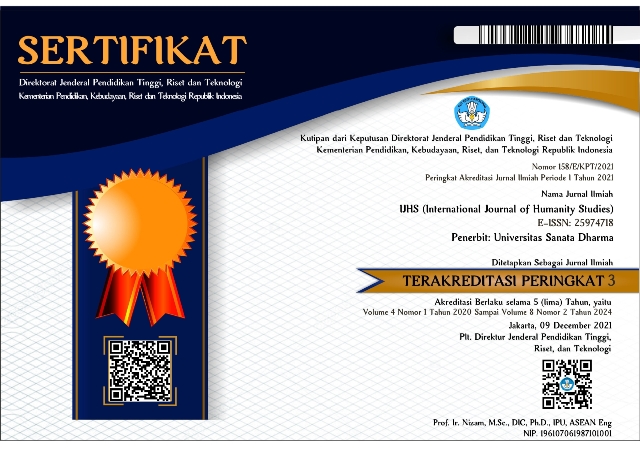SEBASTIAN RODRIGUES’ CHARACTER CHANGES DUE TO JAPANESE SOCIAL POWER IN THE SILENCE MOVIE
(1) Sanata Dharma University
(2) Sanata Dharma University, Yogyakarta
(*) Corresponding Author
Abstract
The present study investigates the changes of the characteristics of Sebastian Rodrigues, a Catholic priest, before and after experiencing the social power in Japan. It also investigates the influences of the Japanese social power on the changes of Sebastian Rodrigues’ characteristics in the Silence movie. The setting of the movie is the seventeenth century in Japan, on which Christianity was banned. Sociocultural-historical approach was employed to analyze the movie. The results of the analysis shows that Sebastian Rodrigues’ characteristics before he experiences Japanese social power include being compassionate, faithful, optimistic, and unconfident. After he experiences the social power, his characteristics change into helpless, despair, oppressed and senseless. The Japanese social power influences Rodrigues’ characteristics in five ways, namely forcing him to find the unfairness and violence, catching him, mocking him, making him witness the murder, and forcing him to apostatize. Hence, the power changes Rodrigues’ characteristics.
Keywords
Full Text:
PDFReferences
Brook, J. (2003). Ikitsuki Journal; Once banned, christianity withers in an old stronghold. Retrieved on March 31, 2018 from http://newyorktimes.com/2003/12/25/world/ikitsuki-journal-once-banned-christianity-withers-in-an-old-stronghold.html
Brunce, W. (1955).Religious in Japan: Budddhism, Shinto, Christianity. Santa Barbara, California:Greenwood Press.
Cambridge History of Japan. (1991). Cambridge: University of Cambridge Press.
Cambridge History of Japan. (1988). Cambridge: University of Cambridge Press.
Fiske, S., & Markus, H. (2012). Facing social class: How societal rank influences interaction. New York: Russell Sage Foundation.
Galinsky, A. D., Gruenfeld, D. H., & Magee, J. C. (2003). From Power to Action. Journal of Personality and Social Psychology, 85(3), 453-466. http://dx.doi.org/10.1037/0022-3514.85.3.453
Kellner, D., & Ryan, M. (1988). Camera politica: The politics and ideology of contemporary Hollywood film.Bloomington: Indiana University Press.
Monthevecchio, A. (2017). Silence. Journal of Religion and Film, 21(27), 1-4.
Rohrberger, M. and Woods, S. (1971). Reading and writing about literature. New York: Random House Publisher.
Spiker, J. (2012). Gender and power in the Devil Wears Prada. International Journal of Business, Humanities and Technology, 2(3), 16-26.
Urakawa, W. (1927). Kirishitan no fukkatsu: Ressurection of Catholics in Japan. Tokyo: Nihon Katorikku Kankokai.
Watsuji, T. (1963). Complete works of Watsuji Tetsuro. Tokyo: Iwanami Shoten.
Weber, M. (1968). Economy and society: An outline of interpretive sociology. Berkeley, California: University of California Press.
Wrong, D. (1996). Power: Its forms, bases, and uses. New Brunswick, New Jersey: Transaction.
Yang, W., Jin. S., He, S., Fan, Q., & Zhu, Y. (2015). The influence of power on humanity: Self-dehumanization in powerlessness. PLos ONE,10(5). Retreived on May 12, 2018, from http://doi.org/10.1371/journal.pone.0125721
DOI: https://doi.org/10.24071/ijhs.v3i1.2007
Refbacks
- There are currently no refbacks.
Copyright (c) 2019 Maria Gratia da Silva, Priyatno Ardi
Indexed and abstracted in:
IJHS Sinta 3 Certificate (S3 = Level 3)
International Journal of Humanity Studies (IJHS) has been nationally accredited Sinta 3 by the Ministry of Education, Culture, Research and Technology of the Republic of Indonesia based on the decree No. Surat Keputusan 158/E/KPT/2021. Validity for 5 years: Vol 4 No 1, 2020 till Vol 8 No 2, 2024

This work is licensed under CC BY-SA.
Creative Commons Attribution-ShareAlike 4.0 International License.
p-ISSN: 2597-470X (since 31 August 2017); e-ISSN: 2597-4718 (since 31 August 2017)
Notice: The opinions expressed in this publication are those of the authors. They do not purport to reflect the opinions or views of the editorial team or publishers.
International Journal of Humanity Studies (IJHS) is a scientific journal in English published twice a year, namely in September and March, by Sanata Dharma University, Yogyakarta, Indonesia.


















